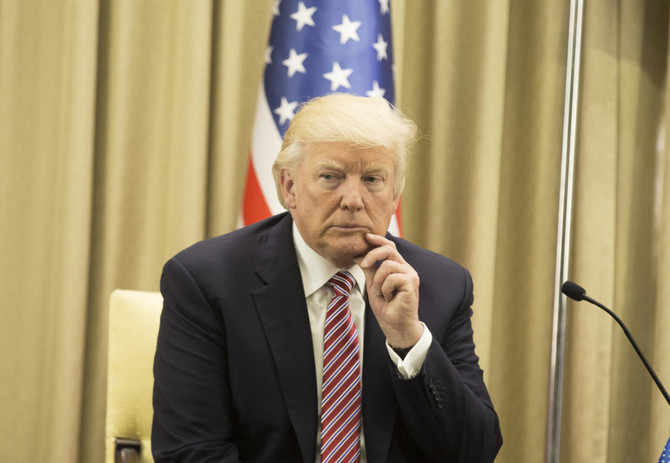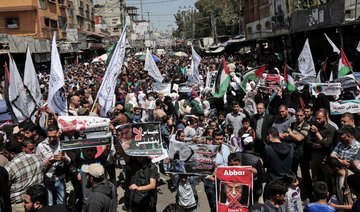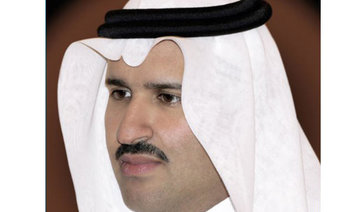BETHLEHEM: Donald Trump makes the short trip from Jerusalem to Bethlehem Tuesday to meet Mahmud Abbas, who hopes to convince the unpredictable US president to remain committed to an independent Palestinian state.
His talks in Bethlehem with the Palestinian president come after Trump on Monday made a heavily symbolic visit to the Western Wall in Jerusalem and met Israeli Prime Minister Benjamin Netanyahu.
Later Tuesday, Trump will return to Jerusalem to visit the Yad Vashem Holocaust memorial and give a speech at the Israel Museum before wrapping up his two-day stop.
Trump's visit to Israel and the Palestinian territories is part of his first trip abroad as president, and follows an initial leg in Saudi Arabia, where he urged Islamic leaders to confront extremism.
He has spoken of reviving long-stalled peace efforts between the Israelis and Palestinians, but few specifics have emerged of how he intends to do so.
Before dinner at Netanyahu's residence on Monday, Trump avoided delving into details.
"I've heard it's one of the toughest deals of all, but I have a feeling that we're going to get there eventually, I hope," he said.
Earlier Monday, Trump also lashed out at Iran, Israel's arch-enemy, saying it should never be allowed to have nuclear weapons and criticising Tehran for supporting "terrorists" -- a reference to militant groups it backs in the region.
He said Iran should have thanked the United States for the 2015 nuclear accord between Tehran and world powers because it led to sanctions being lifted.
"Instead of saying thank you to the United States, they now feel emboldened," Trump said.
In Tehran on Monday, Iran's newly re-elected President Hassan Rouhani ridiculed US strategy in the Middle East, dismissing Trump's summit with Arab leaders in Saudi Arabia as "just a show".
Security will be tight for Trump's journey to Bethlehem, a 20-minute drive from Jerusalem but located across Israel's controversial separation wall.
The wall is part of a project begun in 2002 during the second Palestinian intifada, or uprising, that is to extend some 700 kilometres (450 miles) once completed.
It is a stark symbol for Palestinians of Israel's 50-year occupation of the West Bank, and in Bethlehem the wall has been covered with graffiti and street art.
Trump is to meet Abbas at the presidential palace in Bethlehem, which holds deep significance as the site where Christians believe Jesus was born.
A banner hung in the city said "the city of peace welcomes the man of peace" along with photos of Abbas and Trump.
Hossam Zomlot, an aide to Abbas, said that "if President Trump wants to mediate and leads us to a historic agreement, a major agreement, we are ready to be his partners".
Their talks come with hundreds of Palestinians in Israeli jails on hunger strike since April 17, and activists were hoping to display banners in Bethlehem to drawn Trump's attention to it.
On Monday, Palestinians also held a general strike in support of the prisoners.
Clashes broke out near a checkpoint between Jerusalem and Ramallah involving several hundred stone-throwing youths and Israeli soldiers who responded with rubber bullets and tear gas, leaving at least one wounded.
On Monday night in the Gaza Strip, the Palestinian enclave run by Abbas's rivals Hamas, the Islamist movement organised a demonstration to denounce its labelling as a "terrorist" group by many Western governments, including the United States.
Trump and Abbas met earlier this month at the White House.
Trump initially sparked deep concern among Palestinians when he backed away from the long US commitment to a two-state solution to the conflict.
Meeting Netanyahu in Washington in February, he said he would support a single state if it led to peace, delighting Israeli right-wingers who want to see most of the West Bank annexed.
During his election campaign, Trump also advocated breaking with decades of precedent and moving the American embassy from Tel Aviv to Jerusalem, alarming Palestinians.
He has since said the move was still being looked at.
At the same time, he urged Israel to hold back on settlement building in the West Bank, a longstanding concern of Palestinians and much of the world.
The most high-profile moment of Trump's stay in Jerusalem was his visit to the Western Wall, one of the holiest sites in Judaism.
He became the first sitting US president to visit the site in the Israeli-annexed east of the city.
He was not accompanied by any Israeli leaders during the visit.
Allowing them to do so could have led to accusations that Washington was implicitly recognising Israel's unilateral claim of sovereignty over the site, which would break with years of US and international precedent.
The status of Jerusalem is ultra-sensitive and has been among the most difficult issues in Israeli-Palestinian peace talks, stalled since April 2014.
Israel occupied the West Bank, including east Jerusalem, in the Six-Day War of 1967.
It later annexed east Jerusalem in a move never recognised by the international community and claims the entire city as its capital.
The Palestinians see east Jerusalem as the capital of their future state.
After Israel and the Palestinian territories, Trump will head to the Vatican, and to Brussels and Italy for NATO and G7 meetings.
Trump heads for Bethlehem to see Palestinian leader
Trump heads for Bethlehem to see Palestinian leader

Sudan now has highest number of people in need ‘anywhere in the world,’ UN warns

- Spokesperson Stephane Dujarric presses states to provide urgent financial support to help meet humanitarian needs that have reached ‘extraordinary levels’
- 34m people expected to need aid this year; UN response plan calls for $2.9bn of funding to provide food, nutrition, clean water, health and protection services, and education
NEW YORK CITY: The UN on Friday pressed member states to provide urgent financial support to help stave off further suffering in war-torn Sudan, where nearly 34 million people are now expected to need assistance this year — the highest number anywhere in the world.
Spokesperson Stephane Dujarric said that despite the “extraordinary humanitarian needs,” operations remain perilously underfunded and aid workers face mounting risks.
The UN’s 2026 Humanitarian Response Plan for Sudan calls for $2.9 billion of funding to provide more than 20 million people with life-saving food, nutrition, clean water, health and protection services, and education. But funding lags behind needs, complicating efforts to scale up deliveries of aid.
The civil war between rival military factions in the country, which will enter its fourth year in April, is driving several overlapping emergencies, including acute food insecurity and outbreaks of disease.
According to the UN’s World Food Programme, more than 21 million people in Sudan face high levels of acute hunger, and famine conditions have been confirmed, or are feared to be present, in several regions.
Humanitarian workers continue to face “grave danger,” Dujarric said. In recent months, 92 of them, mostly Sudanese, have been killed, injured, kidnapped or detained, he added, and more than 65 attacks on healthcare providers and patients have been recorded.
Aid groups also warn that conflict-related obstacles, including blockades, drone strikes, and sporadic access restrictions, continue to hamper distribution efforts.
The UN has highlighted the fact that amid the growing displacement of people in North Darfur and North Kordofan, where hundreds of thousands of civilians have been uprooted, water and sanitation services are collapsing in affected areas.
The humanitarian crisis is compounded by regional spillover. Neighboring Chad has closed its border with Sudan amid security concerns, complicating the cross-border flow of aid and threatening already fragile refugee-support systems.
Dujarric warned that without increased donor support and improved access, the skills and commitment of aid workers will not be enough to keep pace with spiraling needs.
“Delivering aid at this scale requires flexible funding and guaranteed humanitarian access, so that workers can reach people in need and they can reach them safely and rapidly and without any obstruction,” he said.














